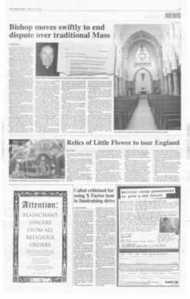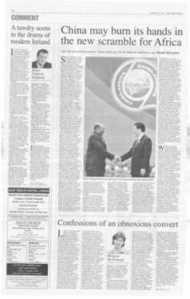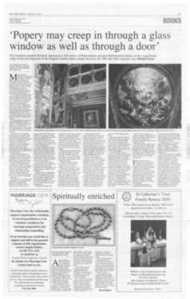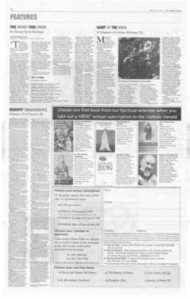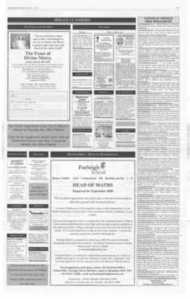Page 4, 22nd February 2008
Page 4
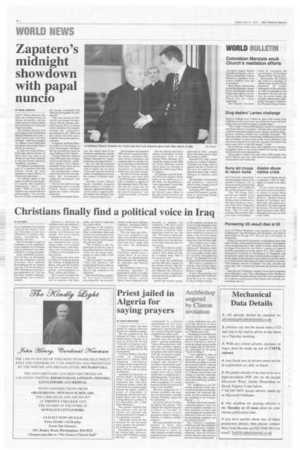
Report an error
Noticed an error on this page?If you've noticed an error in this article please click here to report it.
Tags
Share
Related articles
The End Of A Reign In Spain?
The Bitter Struggle For The Soul Of Spain
Spanish Pm Meets Prelate
Zapatero Refuses To Attend Papal Mass
Nuncio Leaves ' Berlin
Zapatero 's midnight showdown with papal nuncio
BY MARK GREAVES
SPAIN'S Prime Minister has spent an evening locked in intense discussions with the papal nuncio in a bid to defuse an escalating row between Church and state.
The meeting between Jose Luis Zapatero and Archbishop Manuel Monteiro de Castro — which lasted until well after midnight — had been arranged "to address recent difficulties and clashes between the Church and the government".
It came only weeks before a knife-edge general election in Spain and was seen as an attempt by the Prime Minister to stop the Church hierarchy "meddling" in politics.
Mr Zapatero had reacted furiously to a statement from the bishops which, he said, appeared to urge Catholics to vote for the opposition.
The bishops spoke of "the danger of political and legislative choices that contradict fundamental values", and added: "While it is true that Catholics may support different political parties ... it is also true that not all their programmes are equally compatible with faith and the demands of Christian life."
They also seemed to criticise the government for negotiating with the Basque separatist group ETA, a charge which infuriated Mr Zapatero because the conservative government in the 1990s had also dealt with ETA and a Catholic bishop had acted as a mediator.
In response, the Prime Minister called for the bishops to show "more respect" and hinted that the government could cut state funding for the Church.
Foreign Minister Miguel Angel Moratinos also strongly criticised the bishops' conference, saying it was a "ftmciamentalisf' body which did not represent most Catholics.
He said that Spain's ambassador to the Holy See had registered the government's "perplexity and surprise" with the Vatican.
The row has shown no sign of quietening down as several Church leaders retaliated against the country's Socialist leadership.
Archbishop Fernando Sebas tian , the retired head of the Pamplona archdiocese, said the government's reaction to the bishops' statement was "disproportionate and opportunistic".
He said the government should recognise the Church's right to speak out on moral issues and accused political leaders of indifference towards the country's Catholic traditions.
Another senior Church figure, Cardinal Augustin Garcia-Gasco y Vicente of Valencia, repeated the bishops' call for voters to support political leaders who will enact "just laws, based on natural law". The Socialists were elected in 2004 and have legalised samesex unions, introduced fasttrack divorce procedures and scrapped plans to include religious education in the national curriculum. They also eased regulations on abortion and embryonic stem-cell research.
The latest row broke out after 40 bishops and more than 150,000 Catholics attended a rally in Madrid in support of the traditional family. The bishops told the crowd that the country was -heading towards the end of democracy" and "going backwards" on human rights. But the bishops have had a stormy relationship with the government since it was elected. When Benedict XVI visited the country in July 2006 the Prime Minister caused much anger by refusing to attend the outdoor papal Mass in Valencia.
Mr Zapatero greeted Benedict XVI as he stepped off the plane but his failure to go to the Mass was described as a "grave discourtesy" by the bishops' official newspaper.
Dr Joaquin Navarro-Valls, the Vatican's press officer at the time, pointed out that even Fidel Castro — who was excom municated in 1962 — attended Mass when John Paul II visited the country in 1998.
Benedict XVI told a crowd of almost a million Catholics: "Attempts are being made to organise the life of society on the basis of subjective and ephemeral desire alone, without reference to objective, prior truths."
He added that "governments and legislators... [need to reflect on the evident good of the traditional family".
In January 2005 John Paul II accused Mr Zapatero's government of "promoting disdain towards religion".
blog comments powered by Disqus




